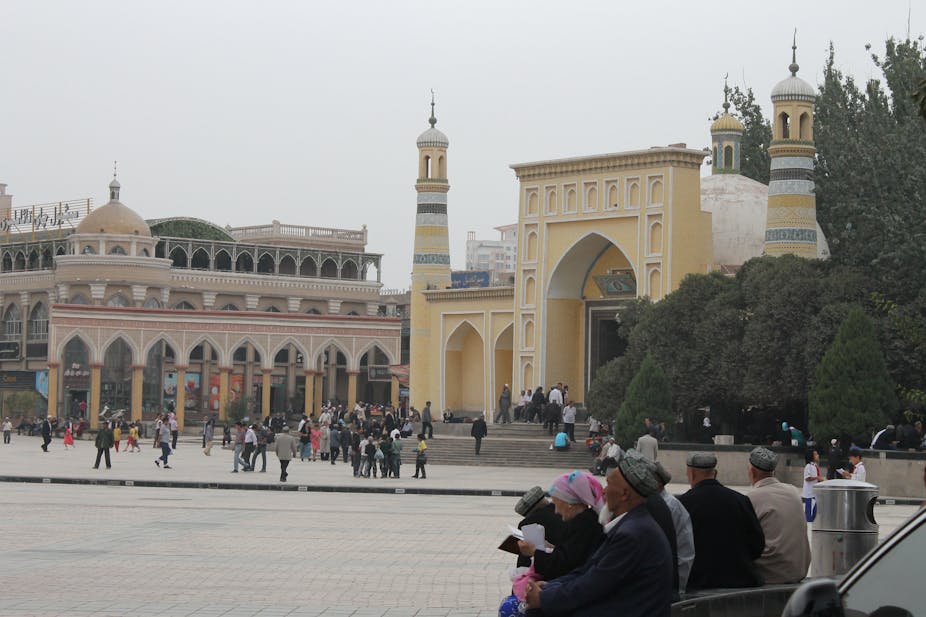The Chinese government claims the Xinjiang Uyghur Autonomous Region is an example of multi-ethnic harmony and stability. Yet China’s repeated attempts to silence foreign reporting of Uyghur issues – as we saw this week, when officials tried to censor coverage of Xinjiang on ABC TV’s Foreign Correspondent – suggest it has something to hide.
Since annexing Xinjiang in 1949, government-sponsored Han migration to the north-west Chinese province has radically altered its ethnic ratio. With the Han Chinese population growing rapidly, the Turkish-speaking Sunni Muslim Uyghurs and other regional ethnic groups have been swamped.
Urumqi, the capital of Xinjiang province, where deadly race riots broke out in 2009.
Religious suppression is well-documented, as are brutal crackdowns on regional uprisings.
Life expectancy for Uyghurs is 10 years less than their Han Chinese counterparts. Employers routinely advertise positions for ‘Hans only’.
Uyghurs are also far more likely to contract HIV. Xinjiang has long had one of the highest provincial rates of HIV/AIDS in China.
In addition, the life sentence handed down to moderate Uyghur academic Ilham Tohti this week, after a closed trial, highlights how serious the consequences can be for those advocating on behalf of the Uyghur minority.
Censorship backfiring
However, when clumsy officials attempt to censor coverage of Xinjiang in Australia, these issues become glaringly obvious. It is also clear that Chinese authorities still do not understand that their efforts to impede free speech simply do not work outside China.
As the flood of tweets during and after this week’s ABC TV’s Foreign Correspondent showed, China’s attempts to stop people talking about China’s Uyghurs drew a wider audience for the program.
Ratings for the Crackdown story reached 623,000 in the five-city metropolitan areas of Melbourne, Sydney, Adelaide, Brisbane and Perth. It out-rated previous weeks’ episodes, picking up approximately 38,500 more viewers. In September, it was beaten only by Eric Campbell’s report on a Tibetan refugee returning to Tibet – another sensitive topic for China.
The Crackdown story showed gutsy journalism by Stephen McDonell and Wayne McAllistair in the face of ever-present surveillance and interference, bordering on intimidation, by Chinese authorities.
It has been reported by the ABC and other news organisations that in a meeting held two weeks ago, Chinese embassy officials warned the ABC that broadcasting the story would have “wider implications” for the ABC, potentially referring to its business links with Shanghai Media Group and CCTV.
Race riots and the Melbourne Film Festival
This is not the first time that China has tried to stop information on Xinjiang from reaching the Australian public.
In 2009, deadly race riots broke out in Urumqi, the capital of Xinjiang. In this incident, 197 people were killed when Uyghur and Han Chinese civilians clashed on the streets. These riots were, in part, sparked by the beating deaths of at least two Uyghur toy factory workers by their Han Chinese counterparts in the coastal Guangdong Province.
Less than one month later, Rebiya Kadeer, the world-recognised leader of the Uyghur community living in exile, applied for an Australian visa. She planned to travel to Australia to visit Uyghur communities. She was also scheduled to attend the screening of Jeff Daniel’s documentary about her life, The Ten Conditions of Love, which was screening at the Melbourne International Film Festival.
Senior officials from the Chinese embassy pressured the government to deny Kadeer a visa. The issue was even debated in parliament, with then foreign minister Stephen Smith responding to the then opposition that there “was no basis for denying her entry to Australia”. He also stated that the government had stood up to China on this issue.
Following this defeat, the Chinese officials then attempted to have the documentary pulled from the Melbourne International Film Festival. They made protestations to both the festival organisers and the Melbourne Lord Mayor to effectively censor the film. Like their attempts to prevent Kadeer from receiving a visa, these attempts were unsuccessful.
Not happy with this outcome, a number of Chinese films were pulled from the festival in protest. In addition, the festival’s website was subject to a number of cyber-attacks and organisers received a barrage of email complaints about the film screening. In the end, these tactics attracted more attention to the film and it was screened to a much larger audience than originally anticipated.
Unperturbed, the officials made one more attempt at censorship. Kadeer was scheduled to speak at the National Press Club and Chinese officials attempted to have her appearance cancelled. Despite the pressure applied, this attempt also failed.
During her address, Kadeer jokingly thanked the Chinese government for the high level of publicity they had attracted to her visit and to the documentary screening.
Silencing dissent
Australia is not alone in experiencing these attempts to censor discussion of the Uyghurs. Following her visit to Australia, Kadeer’s scheduled seminar at the University of Auckland in New Zealand came perilously close to being cancelled after Chinese authorities pressured university leaders on the matter. After a significant backlash from students and academics, the seminar went ahead.
But the Chinese have had some success in their battle to censor news on Xinjiang and the Uyghurs. In 2010, Taiwanese authorities imposed a three-year ban on Kadeer’s entry to this outlying province of China. The Kadeer ban is interesting as Taiwan also has a troubled relationship with the mainland, and segments of its population also desire full independence from mainland China.
China’s repeated efforts to censor reporting of the Uyghurs and Xinjiang, and the fact that those efforts regularly backfire, demonstrate there is a problem in how China perceives its ability to control coverage of its internal affairs beyond its borders.
But it also demonstrates there are real problems in Xinjiang – which the Chinese authorities would rather have kept out of sight from the world.

